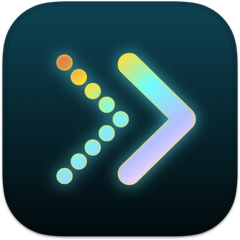Product Introduction
- Substage is a macOS utility that integrates directly with Finder as a docked command bar, enabling users to execute file operations and system tasks through natural language prompts. It translates user instructions into terminal commands using AI models like GPT-4.1 mini, Claude, or locally hosted alternatives, automating actions such as file conversion, metadata queries, and folder organization.
- The core value lies in bridging the gap between casual users and advanced terminal functionalities by eliminating the need to memorize or manually type command-line syntax. It prioritizes speed and accessibility for common workflows while maintaining privacy controls for sensitive data.
Main Features
- Substage converts natural language prompts into executable terminal commands using integrated AI models, supporting operations like "convert to 1080p MP4," "zip these files," or "check PDF author." Commands are validated for risk levels, with high-risk actions requiring user confirmation before execution.
- The tool supports multiple AI providers, including OpenAI, Anthropic, Mistral, and Google, while offering a "Bring Your Own AI" license for local model integration via Ollama or LM Studio. This flexibility ensures compatibility with privacy-focused workflows or custom AI setups.
- Privacy-centric design limits data exposure by transmitting only filenames and extensions (not file contents) to AI providers by default, with optional granular controls. Terminal output summaries may include content snippets, but Substage itself does not store user data.
Problems Solved
- Substage addresses the complexity of terminal commands for non-technical users by automating command generation through intuitive language inputs. This reduces errors and learning curves associated with manual CLI usage.
- It targets macOS users who perform repetitive file management tasks, such as designers, writers, and developers, seeking efficiency without memorizing syntax. Advanced users benefit from rapid command generation for complex operations.
- Typical scenarios include batch-resizing images, converting media formats, checking system metadata (e.g., CPU type), organizing files into ZIP archives, and performing calculations (e.g., unit conversions) directly from Finder.
Unique Advantages
- Unlike standalone launchers or script managers, Substage docks natively under Finder windows, contextualizing commands based on selected files. This tight integration reduces workflow interruptions compared to switching between apps.
- The tool uniquely combines multiple AI providers with local model support, allowing users to balance speed, cost, and privacy. For example, GPT-4.1 mini handles simple tasks quickly, while Claude 3.7 Sonnet resolves complex prompts.
- Competitive advantages include granular privacy controls (e.g., transmitting only file extensions), a one-time "Bring Your Own AI" purchase option, and preconfigured integrations for ffmpeg, sips, and other CLI tools to ensure reliable command execution.
Frequently Asked Questions (FAQ)
- How does Substage handle privacy with AI providers? Substage transmits selected filenames and extensions by default but excludes file contents unless terminal output summarization requires it. Users can opt for local AI models via Ollama or disable filename sharing, though this may reduce command accuracy.
- What types of commands can Substage execute? It supports file operations (conversion, compression), system queries (hardware specs), document processing (word counts), and calculations. Complex multi-step workflows (e.g., "organize folder by type") require breaking into individual commands.
- Which macOS versions are compatible? Substage requires macOS 15 Sequoia or newer due to dependencies on native frameworks for Finder integration and security protocols. Older versions are unsupported.
- Can Substage generate images or transcribe audio? No, it focuses on executing terminal commands rather than AI-generated content. Tasks like image generation or audio transcription require external tools not currently integrated.
- Is internet access mandatory for Substage? Internet access is required for cloud-based AI providers (e.g., OpenAI), but local models via Ollama or LM Studio operate offline. The "Bring Your Own AI" license enables fully offline workflows.
